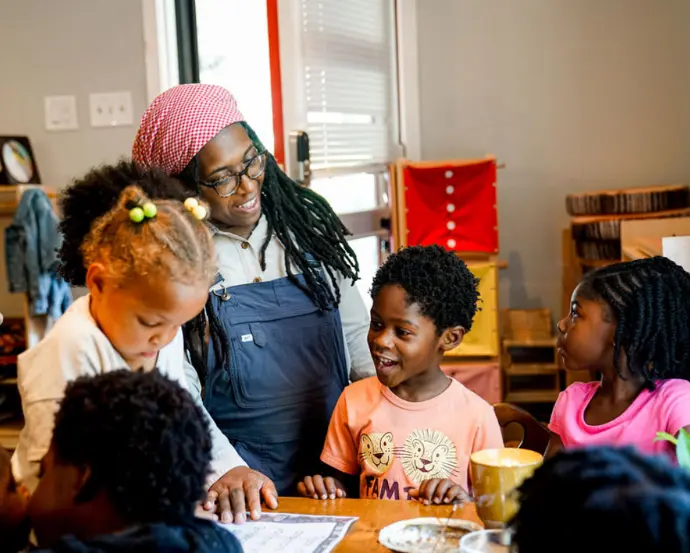ID: An up close photo of a Black teacher and students in a classroom setting.
Many teachers may not have had this special honor day on their radar but as the crisp October air settled over the fields and orchards across America, we celebrated National Farmer's Day on October 12th.
The annual observance not only honors the tireless efforts of farmers but also serves as a necessary reminder of our intrinsic connection to the land that sustains us. As a Montessori and forest school teacher, I have witnessed firsthand the transformative power of fostering this connection, especially among Black children whose relationship with nature has been strained by generations of systemic inequalities.

Meet Ashley...
"In my work as an educator, I have observed that many children have become disconnected from the sources of their food."
ID: A Black teacher wearing denim overalls with glasses smiling down at her five students. The children are either conversing with her or working at a desk within the classroom.
The roots of National Farmer's Day stretch back to the 1800s, initially known as Old Farmer's Day while it was not a national day of recognition then the significance of this day has grown over the past century. However, agriculture itself has an even more ancient lineage, dating back to around 10,000 B.C. when nomadic tribes first began to cultivate crops. This pivotal shift in human history laid the groundwork for the development of civilizations and economies. Today, in the United States, the agricultural sector continues to be a cornerstone of the economy, employing millions and serving as the lifeblood of rural communities across the nation.
In my work as an educator, I have observed that many children have become disconnected from the sources of their food. This disconnection is even more pronounced among Black children, whose ancestral ties to agriculture have been severely impacted by a history of racist laws and policies. From the forced agricultural labor during slavery to the discriminatory practices that led to a sharp decline in Black-owned farms throughout the 20th century, the relationship between Black communities and the land has been complex and often painful.
That is precisely why weaving in the full history of agriculture within your learning spaces is crucial. Creating opportunities for children to plant, grow, and care for crops allows for wonder when they pull their first onion from the soil or taste a tomato they've nurtured from seed. These experiences are more than just educational; they're healing, empowering, and vital for the future of our planet.
As we celebrate National Farmer's Day, it's crucial to consider how we can use this observance as a platform for education and reconnection. I have developed lessons for my early learners, 3-5 years old that not only teach about farming but also explore the rich cultural heritage of Black agriculture in America. If you are interested in having these lessons in your learning space, you can download them here.
As a teacher, I believe that acknowledging and teaching about National Farmer's Day is crucial, especially in urban environments where the connection to agriculture might seem distant. This day provides an opportunity to engage students in multidisciplinary learning. You can explore plant biology and sustainable farming practices, delve into the agricultural revolutions that shaped civilizations, and examine the impact of farming on local and global markets. This can open up a door to extend from a micro-level of teaching about your classroom garden or a local farm to a macro-level. Moreover, teaching about National Farmer's Day can inspire discussions about career opportunities in agriculture. As technology continues to transform farming practices, the industry needs diverse talents, from data scientists to environmental specialists. By exposing young people, particularly Black youth, to the breadth of agricultural careers, we can help ensure a vibrant and innovative future for farming.
Parents also play a crucial role in this educational journey as well. I encourage families to start home gardens, visit local farms, or cook meals using locally sourced ingredients. These activities spark conversations about food systems and sustainability, instilling in children a sense of connection to the land and an appreciation for the work of farmers.The question at the heart of our work is: How can the next generation care for, protect, and become politically engaged with the health of this planet if they do not spend time understanding Earth? This question becomes even more critical when considering communities that have been historically disconnected from land ownership and agricultural practices. At Gather, Shelby, my co-founder, and I take this connection a step further. Children spend entire days immersed in nature, learning to read the landscape, understand ecosystems, and recognize their place within the natural world. These experiences are particularly transformative for Black children, many of whom may not have had such opportunities due to urban environments or lack of access to green spaces.
As we celebrate National Farmer's Day, we're not just honoring the farmers of today; we're cultivating the earth stewards of tomorrow. By providing children with opportunities to engage with agriculture and nature, we're planting seeds of change. These experiences foster a deep, personal understanding of the importance of sustainable agriculture, environmental protection, and food justice.
National Farmer's Day is more than just a date on the calendar. It's a call to reconnect with our agricultural heritage, to honor the diverse history of American farming, and to invest in a future where all children, regardless of their background, feel a strong connection to the land. As an educator, I see this day as an opportunity to bridge gaps – between urban and rural, between past and future, and between communities and the earth that sustains us all. By fostering these connections, we're not just celebrating farmers; we're nurturing the growth of a more equitable, sustainable, and connected world.
ID: A Black woman wearing glasses, a button down shirt, and a sweater is smiling in a grey and white photo in front of a bright white background.
